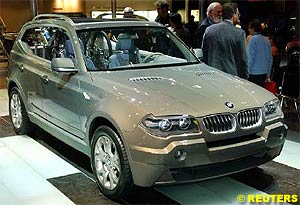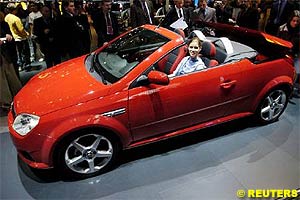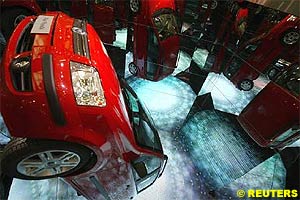

Automotive News and Reviews for the Petrolhead
Reuters Motoring Commentator
In this week's issue:
- BMW Sticks to Profit Goal
- Car Sales Make First Rise in Five Months
- Panda Orders Keep Rolling In
German luxury car maker BMW has raised its dividend and stuck to its forecast of higher profits this year, displaying confidence in its core business after one-off charges pushed 2003 earnings below market forecasts.
The Munich-based firm posted 2003 pre-tax profit of 3.2 billion euros (2.2 billion pounds) last Thursday, down 2.8 percent and just short of the average 3.3 billion forecast by a 26-strong poll of analysts due to 160 million euros in exceptional items.
"This is no sign of a deterioration in operating earnings," HVB analyst Albrecht Denninghoff said.
"Moreover, the dividend increase turned out to be higher than expected. That's a good signal of confidence," he said, keeping his buy rating and 46 euro per share price target.
European carmakers have been battling a slump in demand on both sides of the Atlantic but BMW has been insulated to a degree by its premium image. BMW was the only leading German carmaker to defend its market share in western Europe so far this year, according to data from the European Automobile Manufacturers Association.
It reiterated that it expected earnings to grow in 2004, just two days after Volkswagen said that a rise in operating earnings this year was an ambitious target. With the launch of new models like the 6-series coupe and cabrio, the X3 compact sports utility vehicle, and the 1-series hatchback, vehicle sales should also rise on the year, BMW said.
Financial Services Compensate
Like other global carmakers, BMW said record profits in its financial services arm nearly compensated for a 4.2 percent decline in pre-tax earnings at its core automotive division due to the cost of developing new models.
Many carmakers - including GM, Ford and Volkswagen - have found it far easier to make money selling financing deals to customers rather than cars. BMW's one-off charges related to an extra 110 million euros in reserves built in response to a change in the law on early retirement and to an extraordinary loss of 50 million euros on new rules governing corporate tax credits.
"If one were not to account for these two effects, then there would be a net profit of 2.06 billion euros, or 3.06 euros per share," a BMW spokesman said.
BMW's net profit decreased 3.6 percent to 1.95 billion euros from 2.02 billion in the previous year, compared to flat profits forecast by analysts. The company reported earlier this year that 2003 revenues declined 2.1 percent to 41.5 billion euros, despite boosting car sales 4.5 percent to 1.1 million units.
Written by Christiaan Hetzner
Car sales in western Europe rose for the first time in five months in February as a welter of new models and brighter economic prospects started to lure motorists back into showrooms.
Brussels-based carmakers association ACEA said in a statement last week that new car registrations rose to 1,033,312 vehicles in February, up two percent on a year ago with about the same number of business days.
That meant sales in the region so far this year are roughly flat after a 1.6 percent decline in January, and while analysts warned against reading too much into the numbers, some said this could signal the market was primed for recovery.
New car sales in western Europe slipped 1.3 percent in 2003 as consumers, worried about the economy and the war in Iraq, opted to save instead of buying new cars. Japanese carmakers continued their march on the crowded European market, boosting sales by over 17 percent to grab more than 13 percent of the market.
The auto industry, which accounts for about four percent of the European Union's gross domestic product, reflects the wider economy, in particular consumer confidence.
At the Geneva car show last week most executives said the year had got off to a slow start but bet new models and a pickup in the region's economy would spur growth at least around one percent this year, with growth tilted toward the second half.
US-Style Price War
However, the February numbers failed to cheer auto stocks, which fell more than two percent amid wider market gloom as investors fretted about the strength of global economic recovery, and following a bleak outlook earlier this week from Europe's biggest carmaker Volkswagen.
Carmakers are grappling with fierce competition in Europe that is spiralling into a US-style price war with manufacturers increasingly offering profit-eroding incentives to help guard their market share. Volkswagen has been particularly hard hit and said this week a target of boosting operating profit this year was ambitious.
"It's not so much the sales figures that are important, it's the incentives driving them," said Commerzbank analyst Adam Collins. "When Europe's biggest carmaker says it will make no more money this year then it's time to sit up and take notice."
French carmaker Renault saw sales rise 2.9 percent in February as it continued to impress motorists with its love-it-or-hate-it Megane family of cars, while Italy's Fiat, currently scrambling out of financial crisis, boosted sales by 4.9 percent also thanks to new models. Volkswagen fared badly, with a 1.1 percent dip in sales, while PSA Peugeot Citroen, struggling with a dearth of new models, saw sales fall 1.8 percent.
DaimlerChrylser sales fell 6.2 percent due to model changeovers at its upscale Mercedes brand and weakness at its Chrysler division, while U.S. giant Ford also had a rough month with sales down 2.8 percent. The ACEA said the figures showed contrasting pictures in different countries, with sales in Spain and Britain on the rise, but Italy, France and Germany all lower.
Written by Rebecca Harrison
Fiat has now won 168,000 orders for its new small Panda car, meaning the rate of orders is stable at around 20,000 a month so far this year.
Fiat aims to sell between 180,000 and 200,000 of the tall mini this year and hopes to push more sales outside of its core Italian market, betting that its Multijet diesel engine will attract attention in Europe, where diesel is gaining ground.
Fiat Auto Chief Executive Herbert Demel said last Friday 47 percent of the Panda orders had come from Italy. In a typical year, about 40 percent of Fiat's cars are sold in its home market.
"Our work is beginning to bear fruit. We know the road to profit is long and we have ambitious targets but they are based on solid foundations and are absolutely within our reach," Demel said as he picked up a prize for the Panda. The Panda was named European car of the year 2004 by a panel of auto journalists and has picked up a string of prizes since.
A steep drop in sales of a dowdy car line-up pulled Fiat Auto to a record loss in 2002 but new management is tidying up its operations and launching new cars to pull it back to operating breakeven in 2005.
![]() BMW Sticks to Profit Goal
BMW Sticks to Profit Goal
 Despite the decline, BMW proposed increasing its dividend to 0.58 euros per share, which analysts viewed as a signal of confidence for this year, when the company is hoping to benefit from a range of model launches.
Despite the decline, BMW proposed increasing its dividend to 0.58 euros per share, which analysts viewed as a signal of confidence for this year, when the company is hoping to benefit from a range of model launches.
![]() Car Sales Make First Rise in Five Months
Car Sales Make First Rise in Five Months
 "It's still not a great month, and the figures are slightly skewed by a very strong Spanish market," said Societe Generale analyst Philippe Barrier. "But demand is still better than in January and that sets the stage for improvement in March and perhaps a stronger second half."
"It's still not a great month, and the figures are slightly skewed by a very strong Spanish market," said Societe Generale analyst Philippe Barrier. "But demand is still better than in January and that sets the stage for improvement in March and perhaps a stronger second half."
![]() Panda Orders Keep Rolling In
Panda Orders Keep Rolling In
 The Panda, one of a range of cars launched to revive sales and drag the Italian group out of an auto-induced crisis, went on sale in September last year and ratched up 120,000 orders by the end of 2003 against a sales target of 70,000.
The Panda, one of a range of cars launched to revive sales and drag the Italian group out of an auto-induced crisis, went on sale in September last year and ratched up 120,000 orders by the end of 2003 against a sales target of 70,000.
| Contact the Editor |
© 2007 autosport.com . This service is provided under the Atlas F1 terms and conditions.
|
Volume 10, Issue 11
Atlas F1 Exclusive
Inside View into WilliamsF1 with Gene
Interview with Giorgio Pantano
Articles
Every Other Sunday
The Paint Job: Part III
2004 Malaysian GP Preview
2004 Malaysian GP Preview
Malaysian GP Facts & Stats
The F1 Trivia Quiz
Columns
Rear View Mirror
On the Road
Elsewhere in Racing
The Weekly Grapevine
> Homepage |